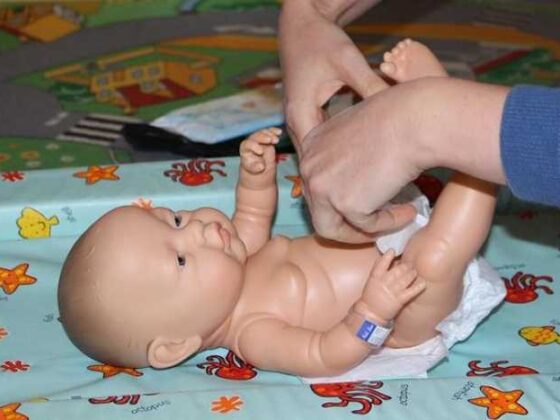Welcoming a new baby into the world is one of life’s most exciting (and overwhelming) adventures. If you’re a first-time parent, you might be feeling equal parts thrilled and totally clueless – and that’s completely normal! Between diaper changes, sleepless nights, and figuring out what all those tiny baby gadgets actually do, it’s easy to feel like you need a crash course in “baby basics.” That’s where this guide comes in. ”Baby Basics 101: A Newbie Parent’s Go-To Guide” is here to help you tackle those early days with confidence, share some tried-and-true tips, and remind you that, yes, you’ve got this! So grab a cup of coffee, take a deep breath, and let’s dive into everything you need to know to get started on your parenting journey.
Getting to Know Your Newborn’s Needs and Cues
Every newborn communicates in their own unique language-mostly thru subtle cues and cries. Learning to interpret these signals is like unlocking a secret code that helps you respond promptly and lovingly. As a notable example, a tiny fist-to-mouth gesture usually means your little one is hungry, while yawning or rubbing their eyes signals sleepiness. Becoming a pro at reading these signs not only reduces your stress but also strengthens the unspoken bond between you and your baby.
Below is a quick cheat sheet to help you decode common newborn cues. Keep it handy on your fridge or nursery wall for instant reference:
| Baby cue | What It Means | How to Respond |
|---|---|---|
| Rooting Reflex (turning head & opening mouth) | Hungry | Offer breast or bottle |
| clenched Fists & Fussiness | Discomfort or overstimulation | Sooth with gentle rocking or swaddling |
| Stretching & Eye Rubbing | Tired | Dim lights, quiet habitat, prepare for nap |
| Arching Back & Crying | Gas or tummy ache | Burp baby, gentle tummy massage |

Mastering the Art of Baby Feeding: Tips for Every Stage
Feeding your little one is a journey filled with learning,patience,and plenty of messes! In the earliest days,whether you choose breastfeeding or formula,the key is to watch for hunger cues like lip-smacking or restless movements instead of sticking strictly to the clock. As your baby grows, it’s essential to gradually introduce new foods while keeping an eye on potential allergies. Offering a variety of textures and flavors not only fuels their growth but also helps develop healthy eating habits early on.
here are some tried-and-true tips to keep you confident at each feeding stage:
- Newborns: Focus on frequent, small feedings and make sure your baby is comfortably latched if breastfeeding.
- 4-6 Months: start with iron-rich purees and slowly introduce fruits and veggies one at a time.
- 7-12 Months: Move toward thicker textures, soft finger foods, and encouraging self-feeding.
| Stage | Feeding Frequency | Key Focus |
|---|---|---|
| 0-3 months | 8-12 times/day | Establish comfort and bonding |
| 4-6 months | 4-6 times/day | Introduce solids gradually |
| 7-12 months | 3 meals + snacks/day | Encourage independence |

Creating a Cozy and safe Sleep Space Your Baby Will Love
Designing a sleep area that feels like a snug little haven for your baby is more about the vibe than just the items. Think soft textures,gentle lighting,and a calm palette that whispers sweet dreams. A cozy space isn’t just about comfort-it also means minimizing distractions and noise. Blackout curtains,a white noise machine,and even a swaddle can work wonders to keep your newborn feeling safe and serene,drifting off with a contented sigh every time.
safety, of course, is non-negotiable. Keep the crib clear of loose blankets, pillows, or stuffed toys that might pose risks. Use a firm mattress that fits snugly, and opt for breathable fabrics to help regulate temperature. Here’s a quick cheat sheet of must-haves to get started:
- Firm crib mattress: Ensures proper support and fit.
- Fitted sheets only: Avoid loose bedding.
- Swaddle or sleep sack: Keeps baby cozy without suffocation risk.
- Room thermometer: Maintain an ideal 68-72°F (20-22°C).
- Soft, indirect lighting: Encourages calm before bedtime.
| Item | Why It Matters |
|---|---|
| Blackout curtain | Blocks early morning sun to prolong sleep. |
| White Noise Machine | masks household noises for uninterrupted rest. |
| Sleep Sack | Provides warmth safely, eliminating loose blankets. |
Survival Kit Essentials Every New Parent Should have on Hand
Every new parent quickly realizes that having the right gear at their fingertips can make all the difference during those long, unpredictable days and nights. Think of your baby’s survival kit as your trusty sidekick-it should be stocked with essentials that tackle everything from diaper disasters to middle-of-the-night hunger pangs. Key items like disposable diapers, baby wipes, diaper rash cream, and portable changing pads are non-negotiable. don’t forget a couple of changes of clothes because, well, spit-ups and leaks happen! A thermos with warm water for formula mixing and a few pacifiers tucked inside an easy-to-reach pouch can also be lifesavers when you’re out and about.
Besides the usual suspects, keeping a handful of extras can elevate your survival kit from “good enough” to “game day ready.” Here’s a quick rundown of those underrated must-haves:
- Digital thermometer – as checking baby’s temp shouldn’t be a guessing game.
- Nail clippers or baby nail file - tiny fingers grow fast and so do the scratches.
- Muslin cloths or burp cloths – multipurpose magic for spills, spit-ups, or sun coverage.
- hand sanitizer - your best friend when soap and water aren’t nearby.
- Soft nightlight – perfect for feeding sessions without jarring any sleepyheads awake.
| Item | Why You Need It |
|---|---|
| Diaper Rash Cream | Prevents and soothes irritated skin during frequent diaper changes. |
| Portable Changing Pad | Keeps changing surfaces clean and portable no matter where you are. |
| Muslin Cloths | Versatile for everything from burping to sunshine protection. |
| Digital thermometer | Quick and easy health check for peace of mind anytime. |
Q&A
Q&A: Baby Basics 101 - A Newbie Parent’s Go-to Guide
Q: Okay, I’m officially a new parent. Where do I even start?
A: First off,deep breath. You got this! Start with the basics: feeding, diapering, sleeping, and keeping baby safe. Don’t sweat the small stuff - every parent learns as they go. Oh,and ask for help if you need it.Trust me, no one expects you to be perfect!
Q: How often should I feed my baby?
A: newborns usually want to eat every 2-3 hours - yes, that means round-the-clock, hello sleepless nights! Whether breastfeeding or formula feeding, follow your baby’s hunger cues. They’ll let you know when they’re hungry by sucking on their hands, fussing, or rooting.
Q: Diapers… how many do I need?
A: Loads. Like, a LOT. For the first several weeks, expect to change diapers 10-12 times a day.Newborns go through roughly 10-12 diapers daily, so stock up on at least a pack or two of newborn size. And wipes-don’t forget those!
Q: Is there a magic formula for getting my baby to sleep?
A: If only! Babies are their own little sleep bosses. Establish a bedtime routine-think warm bath,gentle rocking,lullabies-to help signal it’s sleepy time. And remember, newborns nap all day and night in small chunks.Try to snooze when your baby snoozes!
Q: How do I keep my baby safe?
A: Safe sleep is key: always place baby on their back to sleep, use a firm mattress, and keep the crib free of blankets, pillows, and toys. Car seats are a must when traveling. Oh,and always supervise tummy time!
Q: When should I call the doctor?
A: If your baby has a fever over 100.4°F (38°C), isn’t eating, is unusually lethargic, or you notice any alarming symptoms, don’t hesitate to call your pediatrician. Trust your instincts – you know your baby best!
Q: Any tips for surviving those exhausting days?
A: Nap when you can, accept offers of help, and don’t be afraid to take a breather. Remember, parenting is a marathon, not a sprint. Oh, and coffee… your new best friend!
Q: Where can I find more support and info?
A: Online parenting groups, your pediatrician, and local parent classes are gold mines. Reading blogs like this one helps too - you’re definitely not alone on this adventure.
got more questions? Drop them in the comments - we’re all in this together!
to sum up
And there you have it-your very own crash course in baby basics! Remember, being a new parent is as much about learning on the job as it is about prepping beforehand. Don’t stress the small stuff, trust your instincts, and don’t be afraid to ask for help when you need it. Before you know it, those late nights and endless diaper changes will be sweet memories (well, maybe). Until then, take a deep breath, enjoy the little moments, and know you’ve got this! Happy parenting!











